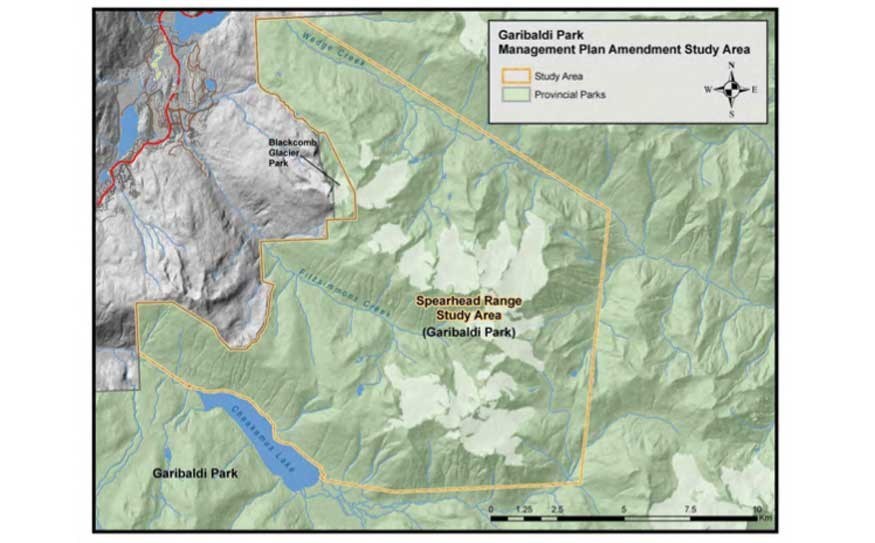Mountain bike advocates in Whistler are dumbfounded after receiving a draft of the updated Garibaldi Park Management Plan on Thursday, Nov. 15. The draft plan would continue to ban mountain biking in the section of the park that includes the Singing Pass and Musical Bumps trails, despite the almost 85 per cent of survey respondents in favour of full or limited access to the area.
It wasn't the only decision made by BC Parks that went against public opinion. Only 32 per cent of those surveyed supported heli-skiing in the park, but the draft plan would continue to grant permits for that use after the current permit expires in 2016.
The clear winner in the draft was the proposed Spearhead Hut plan, which would see three new all-season backcountry huts placed along a new trail that would be built around the Spearhead Traverse — including a new backcountry hut at Russet Lake. Survey respondents were 93 per cent in favour of the hut system.
The public will have an opportunity to comment on the draft at open houses in Whistler and Vancouver. The Whistler open house is on Dec. 6 at the Whistler Conference Centre, from 4 p.m. to 7 p.m.
The Whistler Off-Road Cycling Association (WORCA) is working on its own proposal for mountain biking in the park, and shared its draft with Pique this week. WORCA feels BC Parks used old information to justify the exclusion of bikes, and wants to bring the province up to date on the sport and trail building standards.
WORCA's proposal requests partial access to the park on specific routes. For example, it agreed that sending bikes down Singing Pass Trail was too dangerous for hikers, and proposed that the route be uphill only. To get down, WORCA would build a mountain bike-specific descent from Singing Pass that would connect to Cheakamus Lake.
The WORCA plans would require working with tenure holder Whistler Blackcomb to develop the trail in exchange for offering it to the mountain's own customers as a lift-accessible option.
WORCA spokesperson Louise MacDougall said that WORCA's plan would directly address some of the objections that the province had opening the trails to mountain bikers.
"We want to come to them with a really detailed proposal of how we see (alpine mountain biking) working rather than just asking them to ease the ban," she said. "I don't think there's a lot of understanding of the changes that there have been in the sport. For example, trails are being built more efficiently and have less erosion because the standards have improved so much over the years. We feel we need to put that forward and explain it, and have some detailed descriptions of where we see trails working.
"We're really hopeful they'll listen because the survey was really positive for mountain biking."
As well, the BC Parks draft doesn't take into account the growing popularity of mountain biking when compared to hiking, says MacDougall, or the fact that groups like WORCA can bring huge resources to build and maintain trails.
WORCA will be presenting its proposal to members before the Dec. 6 public meeting. Additonally, WORCA is changing its mandate to include trail building as well as trail maintenance, recognizing the need to develop new trails including the alpine.
WORCA was formed in 1989 in response to the last Garibaldi Park Management Plan, which banned mountain biking in the Singing Pass area while allowing it in the Cheakamus Lake and Elfin Lakes areas. Reopening the park to bikes has been a core mandate of the association, which broke 1,800 members in 2012.
Close to 1,000 people responded to the BC Parks survey. They also received 25 written submissions from stakeholder groups.
Of those respondents, roughly half were in support of mountain biking in the park, while another 35 per cent were supportive "provided there were some conditions placed on how this activity is managed." Of the 15 per cent who were opposed, concerns include user conflicts, damage to trails and alpine ecosystems and the cost of trail maintenance. First Nations stakeholders questioned the compatibility and acceptability of this activity within the park, and damage to the ecology.
In its own analysis, BC Parks indicated it was "concerned that opening this area up to mountain biking would detract from a high-quality hiking experience. Furthermore, to minimize unauthorized off-trail use and conflicts between users, well-defined, dedicated bike trails and associated infrastructure would be required, which are costly to implement and maintain, and result in cumulate impacts to the alpine ecosystem and wildlife."
On the issue of heli-skiing and the lack of support from the survey, BC Parks said the "ongoing operation of Whistler Heli-Skiing is important to Whistler's economy and contributes to the diversity of the recreational opportunities offered in the park. Furthermore, the presence of the heli-ski operator in the park provides an important measure of public safety." However, the draft management plan would not expand current heli-ski tenures further into the park or consider any new areas, and would create a process where BC Parks work with Whistler Heli-Skiing to place restrictions on usage to minimize user conflicts, and impacts on mountain goats and other wildlife. The complete report is online at www.env.gov.bc.ca/bcparks/planning/mgmtplns/garibaldi/garibaldi_mp.html.




